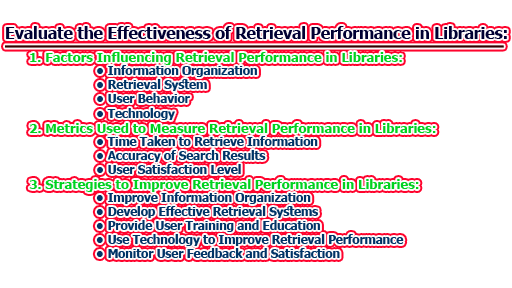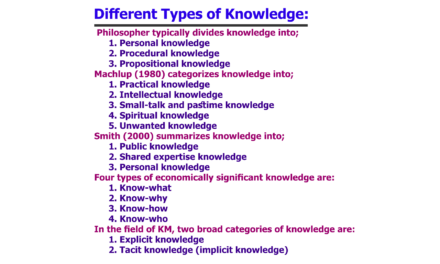Evaluate the Effectiveness of Retrieval Performance in Libraries:
The retrieval performance of a library refers to its ability to provide users with the desired information in a timely and efficient manner. Libraries are expected to offer an extensive collection of books, journals, and other materials, and this collection needs to be accessible to users through effective retrieval systems. The effectiveness of a library’s retrieval performance can be assessed through various metrics, such as the time taken to retrieve information, the accuracy of the search results, and the user satisfaction level. In this article, we will evaluate the effectiveness of retrieval performance in libraries by exploring the factors that influence it, the metrics used to measure it, and the strategies that can be employed to improve it.
- Factors Influencing Retrieval Performance in Libraries: Several factors can influence the retrieval performance of a library. The following are some of the critical factors that libraries need to consider when designing their retrieval systems.
- Information Organization: The organization of information is a crucial factor in retrieval performance. Libraries need to organize their collections in a way that makes it easy for users to find the materials they need. The traditional approach is to organize books and other materials using a classification system such as the Dewey Decimal Classification (DDC) or the Library of Congress Classification (LCC). However, with the increasing use of electronic resources, libraries also need to organize their digital collections effectively. This can be achieved through the use of metadata, which is a standardized set of data that describes the characteristics of a resource. Metadata can help users locate resources by providing information such as the author, title, subject, and publication date.
- Retrieval System: The retrieval system is another critical factor in retrieval performance. The system needs to be designed in a way that allows users to search for information quickly and efficiently. The traditional approach is to use a catalog or index that lists the materials available in the library. However, with the increasing use of electronic resources, libraries need to provide users with online catalogs and databases that allow for efficient searching. The use of search engines, such as Google and Bing, has also become prevalent in libraries.
- User Behavior: User behavior is another important factor that can affect retrieval performance. Users have different information needs, and their search behaviors can vary depending on their knowledge, experience, and preferences. Libraries need to understand the behavior of their users and design their retrieval systems accordingly. For example, some users may prefer to browse the shelves to find the materials they need, while others may prefer to use search engines or online catalogs.
- Technology: Technology is a critical factor in retrieval performance. Libraries need to use technology that is up-to-date, reliable, and user-friendly. The use of automation and artificial intelligence can help improve the efficiency and accuracy of retrieval systems. For example, some libraries use robots to retrieve materials from the shelves, while others use artificial intelligence algorithms to recommend materials based on the user’s search history.
- Metrics Used to Measure Retrieval Performance in Libraries: The following are some of the critical metrics used to measure retrieval performance in libraries.
- Time Taken to Retrieve Information: The time taken to retrieve information is an essential metric in retrieval performance. Libraries need to provide users with the information they need quickly and efficiently. The time taken to retrieve information can be measured by the time it takes for a user to locate a book or article or the time it takes for a search engine to return search results.
- Accuracy of Search Results: The accuracy of search results is another important metric in retrieval performance. Users rely on the accuracy of search results to find the information they need. Libraries need to ensure that their retrieval systems return accurate search results by using reliable search algorithms and metadata.
- User Satisfaction Level: The user satisfaction level is a critical metric in retrieval performance. Users expect libraries to provide them with the information they need quickly and efficiently. Libraries need to monitor the satisfaction level of their users to ensure that their retrieval systems are meeting their needs. This can be measured through surveys, feedback forms, or focus groups.
- Strategies to Improve Retrieval Performance in Libraries: The following are some of the strategies that libraries can employ to improve their retrieval performance.
- Improve Information Organization: Libraries can improve their retrieval performance by organizing their collections in a way that makes it easy for users to find the materials they need. This can be achieved through the use of metadata to describe the characteristics of a resource, and the use of classification systems such as DDC or LCC. Libraries can also use signage and wayfinding tools to help users navigate the physical space of the library.
- Develop Effective Retrieval Systems: Libraries can improve their retrieval performance by developing effective retrieval systems. This can be achieved by using online catalogs and databases that allow for efficient searching. Libraries can also employ search engines that are designed specifically for library collections. These search engines can use natural language processing and other advanced search algorithms to provide users with relevant search results.
- Provide User Training and Education: Libraries can improve retrieval performance by providing user training and education. Many users may not be familiar with the retrieval systems used by the library and may not know how to search for the information they need effectively. Libraries can offer training sessions, workshops, or online tutorials to teach users how to use the retrieval systems effectively.
- Use Technology to Improve Retrieval Performance: Libraries can use technology to improve their retrieval performance. The use of automation and artificial intelligence can help improve the efficiency and accuracy of retrieval systems. For example, some libraries use robots to retrieve materials from the shelves, while others use artificial intelligence algorithms to recommend materials based on the user’s search history.
- Monitor User Feedback and Satisfaction: Libraries need to monitor user feedback and satisfaction to ensure that their retrieval systems are meeting the needs of their users. This can be achieved through surveys, feedback forms, or focus groups. Libraries can use this feedback to identify areas for improvement and to make changes to their retrieval systems as necessary.
In conclusion, retrieval performance is a critical aspect of library services. Libraries need to provide users with the information they need quickly and efficiently. The effectiveness of retrieval performance can be assessed through various metrics, such as the time taken to retrieve information, the accuracy of search results, and the user satisfaction level. Factors that influence retrieval performance include information organization, retrieval systems, user behavior, and technology. Libraries can employ various strategies to improve retrieval performance, such as improving information organization, developing effective retrieval systems, providing user training and education, using technology to improve retrieval performance, and monitoring user feedback and satisfaction. By adopting these strategies, libraries can ensure that their retrieval systems meet the needs of their users and remain relevant in the digital age.
References:
- Abram, S. (2004). Information retrieval and web search. American Library Association.
- Association of College and Research Libraries. (2016). Framework for information literacy for higher education.
- Bates, M. J. (1989). The design of browsing and berry-picking techniques for the online search interface. Online review, 13(5), 407-424.
- Chowdhury, G. G., & Chowdhury, S. (2010). Introduction to digital libraries. Facet publishing.
- Cronenwett, P. (2005). Automated storage and retrieval systems in libraries. Journal of Library Administration, 42(3-4), 121-146.
- Harman, D. (2002). Overview of the TREC 2002 interactive track. In Proceedings of the 11th Text REtrieval Conference (TREC 2002) (pp. 1-15).
- Hirsh, S. G. (2016). Information retrieval: A health and biomedical perspective. Springer.
- Ingwersen, P., & Järvelin, K. (2005). The turn: Integration of information seeking and retrieval in context. Springer.
- Katz, B. (2018). The importance of information retrieval for librarians. Information Today, 35(8), 1-26.
- Kuhlthau, C. C. (2004). Seeking meaning: A process approach to library and information services. ABC-CLIO.
- Lewandowski, D. (2016). Understanding the relevance of context for information retrieval. Synthesis Lectures on Information Concepts, Retrieval, and Services, 8(1), 1-139.
- Mackenzie, D. (2000). User-centered design: An introduction for library and information professionals. Libraries Unlimited.
- Marchionini, G. (2006). Exploratory search: From finding to understanding. Communications of the ACM, 49(4), 41-46.
- Mellon, C. A. (2006). Critical incident technique. Wiley International Encyclopedia of Marketing.
- Nicholas, D., Huntington, P., Williams, P., Watkinson, A., & Jamali, H. R. (2015). Digital information seekers: Behaviour, concepts, and expectations. Routledge.
- O’Connor, L. G., & Kellam, L. (2017). Understanding the user experience: Conducting user research for library websites. Rowman & Littlefield.
- Park, J. R. (2011). Improving the user experience of digital libraries. Library Hi Tech, 29(4), 612-626.
- Savolainen, R. (2016). Everyday information practices: A social phenomenological perspective. Scarecrow Press.
- Talja, S., & McKenzie, P. J. (2007). Editors’ introduction: special issue on information behavior research. Journal of Documentation, 63(1), 3-4.
- Wilson, T. D. (1999). Models in information behavior research. Journal of Documentation, 55(3), 249-270.

Library Lecturer at Nurul Amin Degree College










